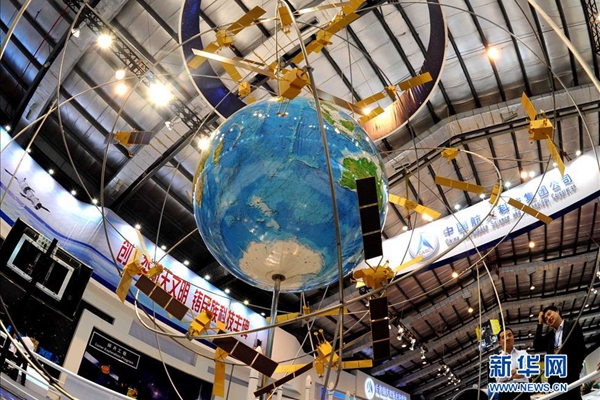China’s BeiDou navigation system to expand to B&R nations
|
|
|
A model of the BeiDou Satellite Navigation system exhibited in Zhuhai [File photo/Xinhua] |
Developers involved with the BeiDou Satellite Navigation system are preparing to make the next step forward in turning the Chinese-produced system into a major global player.
The BeiDou Navigation Satellite System is world’s fourth navigation satellite system, which also includes the GPS system run by the United States, the GLONASS system in Russia and the Galileo system developed by the European Union.
With its accuracy reaching centimeter-levels, the system can provide precise positioning services for urban construction, as it will be able to help accurately place underground gas and and power lines, along with other connections necessary for today’s modern buildings.
Miao Qianjun, secretary-general of Global Navigation Satellite System and Location Based Service Association of China says, “The National BeiDou Precise Service Network so far covers 317 cities across the country, and can provide precise location information, accurate time information and short-message communication service in almost all application areas.”
Steps are now being taken to make Beidou a global network.
“Next month we’re going to officially start networking and launching the BeiDou-3 system, which will provide global coverage. Probably in mid-July, we will launch the first two satellites on one rocket,” Ran Chengqi, director of the China Satellite Navigation System Management Office says. “By the end of next year, we will have put 18 new 18 satellites into orbit, including between six and eight satellites slated for this year.”
This should allow Beidou to start offering services to customers in countries participating in the Belt and Road Initiative by next year.
Over 30 million chips which run the Beidou system have been sold to manufacturers of mobile phones and other systems which can use navigation technology.
Beidou’s high-precision board cards and antennas, for industrial use, are now being exported to more than 70 countries and regions, over 30 of which are along the Belt and Road.
“For example, Beidou can be used to help with the construction of overseas ports and offer service to our country’s high-speed rail services. After the Beidou system becomes available globally, those countries will be able to use the Beidou system to help boster their national economy and improve people’s livelihood,” Sun Jiadong of the Chinese Academy of Sciences says.
China started building its own satellite navigation system in 2000, sending up just two satellites at first to end Chinese dependence on the United States’ GPS system.
Since 2012, Beidou has been able to provide navigation, time and text messaging services across the Asia and Pacific region.
As of last year, satellite navigation became a 30 billion U.S. dollars business in China, with Beidou able to make up around 30-percent of the market share.
By 2020, Chinese officials anticipate satellite navigation services will end up being close to a 60-billion U.S. dollar industry.
